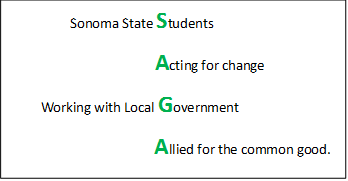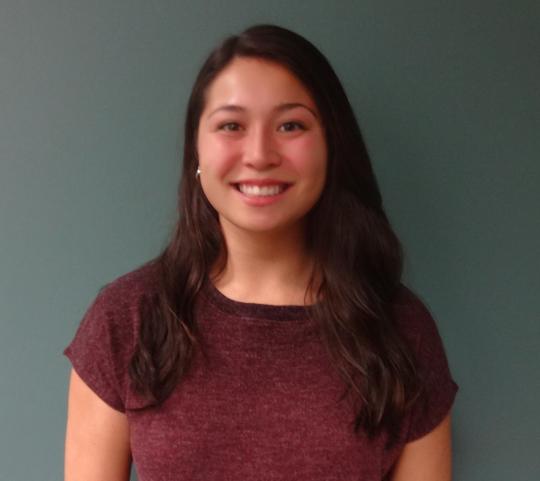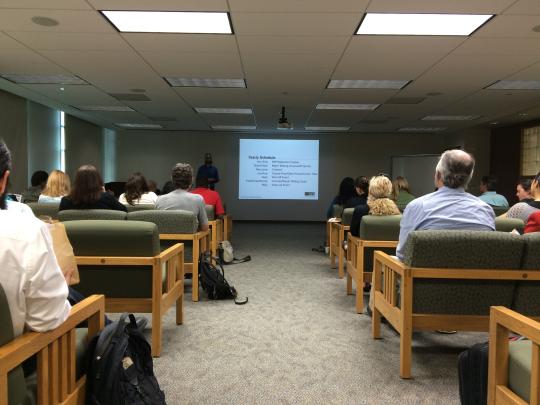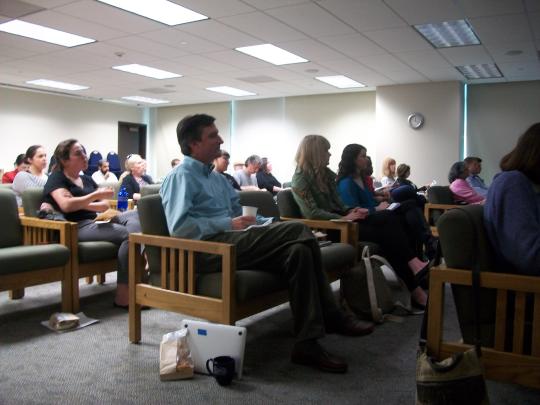SAGA is Coming to SSU
Faculty, staff, administrators, and students gathered to learn more about the Sustainable City Year Program from it's founder and co-director, Nico Larco, an Associate Professor of Architecture at the University of Oregon. They learned how implementing this program here could enhance Sonoma State University's academics and community impact.
The Sustainable City Year Program, or SCYP, was created under the Sustainable Cities Initiative (SCI), a cross-disciplinary organization at the University of Oregon that promotes education, service, public outreach, and research on the design and development of sustainable cities. SCYP aims to connect existing University courses with the local community in order help solve issues that currently exist within the area. As opposed to the traditional approach of research projects, SCYP focuses on projects that the community itself voices its need for. The program also highlights the efficiency and opportunity of solving local community issues with the skills already being taught within the University's classes and majors every day.
SCYP's mission statement reads "We know that creating the sustainable city cannot happen within only a single discipline, and that's why SCI is grounded in a cross-disciplinary approach to solving community sustainability issues." If we are going to commit to advancing sustainability in both higher education and society as a whole, we must think outside of the conventional silos of teaching. An interdisciplinary approach is not only innovative and creative, but it is also essential for this new era to adapt.
SSU Professor, Dr. Timothy Wandling, will be working with other SSU faculty, the City of Santa Rosa and the Environmental Protection Agency (EPA) to launch this program at our University. Here at SSU, it will be called SAGA.

We as a University must continue to enhance and expand our opportunities for students to gain a greater understanding of their roles and their problem-solving abilities. These classes and projects are experiences that students can put on their resume and gain extra-curricular skills that are essential in job-finding, such as communication, problem-solving, teamwork, and many others. Additionally, this program offers the kind of real world training that often students look for outside of the classroom through internships or jobs. By having meaningful and relevant work as part of a class curriculum, we are removing the gap between student activism during college and citizen activism after college.
Snip-bit of Nico's presentation:
SAGA has a variety of benefits for every group that is involved:
For students, the benefits are:
- Real World Experience
- Engagement with Politics
- Sense of Purpose
- Empowering their Education (skills)
- Energy and Focus
For the University and Faculty, the benefits are:
- Putting the 'Public' back into Public Universities
- Building External Relationships
- Building Internal Relationships
- University Image/Visibility
- Platform for Research/Outreach
For the Private Sector, the benefits are:
- Getting Projects 'unstuck
- Educating Future Clients (on Sustainability)
- Groundwork for Projects
- Testing Approaches (Feasible/Political)
- Connecting with the University (Research/Students)
For the Cities, the benefits are:
- Increased Capacity
- Expanded Breadth of Conversation
- Testing the Water (Riskier Solutions)
- Sustainability Overlay
- Outreach
- Moving Projects Forward
- Engaging Marginalized Groups
- Energy (Internally and as External Engagement)
"In a typical year, SCYP addresses 15-25 projects through 20-30 courses with 500+ students across 13+ academic departments dedicating 40,000+ hours of student work. This work has focused on projects related to sustainable architectural design, urban design, planning, cost-benefit analysis, economic development, legal and policy analysis, and community engagement, among others." -SCYP
Two student reactions:
Each Sustainable City Year campus goes through a "matchmaking" process during which both cities and faculty apply to take on a course and project to work on together for a semester. As a result these classes encourage more engagement with the city, including more face-time and stronger partnerships with non-governmental organizations, city councils, and other community leaders. SCYP strives to identify the community's key-problems and connect students with the political willpower to actually make change.
After the end of the semester, the top 2 students in the class are tasked with writing the report of the project which the city can then use for advancing it's work, bringing awareness to its solutions, and for writing grants. This honor of writing the report is rewarded with a monetary stipend. It also brings a level of competitiveness and real-world seriousness to the project. At the end of the year wrap-up event, students present their work and the city and other partners get to share their experiences of working with the students. With these new approaches to education and community engagement, students can finally say, "Wow, I'm not just going to school. Now I have skills and I am valuable to the world."
"I think this is very exciting. I came along not really knowing what to expect, but this has exceeded my expectations. I really hope that we can get behind this program. We have it in our strategic plan that sustainability in its many faces needs to be number one on the campus and this has got to be the way forward. I am looking forward to being part of it!" -Provost Andrew Rogerson

Author: Claudia Sisomphou





